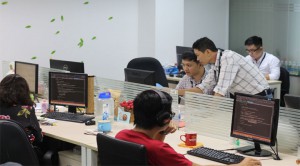Vietnam’s Competitive Edge in Software Outsourcing: A Rising Power in the Tech Landscape
— September 7, 2018Apart from skills and adaptability, low staff turnover in the sector makes the country more attractive to tech giants.
Vietnam has steadily secured its position as a go-to destination for software outsourcing, offering a mix of affordability, skilled talent, and stability that appeals to tech giants worldwide. This appeal has become particularly significant as established outsourcing leader India faces growing challenges.
In a recent article, Forbes described Vietnam as a “small but mighty powerhouse” in IT outsourcing. Global tech leaders, including Intel, IBM, Samsung Display, Nokia, and Microsoft, continue to place substantial investments in the country, attracted by its promising tech workforce and stable environment.
Anna Frazzetto, Chief Digital Officer and Senior Vice President at Harvey Nash, a software development company with over a decade of outsourcing experience in Vietnam, highlights a key factor driving Vietnam’s success: adaptability. She notes that Vietnamese tech specialists rapidly integrate into global teams, adeptly taking on the role of trusted partners. “Technology specialists in Vietnam are comfortable with quickly becoming a natural extension of global clients, ready to challenge norms and bring innovative ideas to the table,” Frazzetto remarks. This willingness to innovate sets Vietnamese professionals apart in a competitive industry, where adaptability is critical.
One of Vietnam’s primary advantages in the outsourcing market is its low employee turnover rate. Unlike neighboring countries such as India and Malaysia, where IT professionals frequently migrate abroad for higher-paying roles, Vietnamese professionals tend to remain within the country. This stability offers an attractive proposition for businesses seeking long-term outsourcing partnerships. Retaining talent over time reduces training costs and fosters deeper integration with international teams, enabling stronger client relationships and more consistent project delivery.
Investment in Education as a Foundation for Growth
Vietnam’s potential as an outsourcing hub also benefits from an ongoing investment in education, particularly in STEM (Science, Technology, Engineering, and Mathematics) fields. Despite certain challenges, such as a lower overall fluency in English compared to India or the Philippines, Vietnam’s emphasis on mathematics and technical education equips the workforce with the foundational skills required for complex software and IT tasks. The country’s approach to cultivating tech talent is underscored by policies that prioritize tech-savvy skills from an early age, positioning Vietnam well for continued growth in IT outsourcing.
Business Process Outsourcing on the Rise
Vietnam’s Business Process Outsourcing (BPO) sector, which includes IT and software services, has shown remarkable expansion. A 2017 PwC report, Spotlight on Vietnam, ranked BPO among the top five sectors for foreign investment in the country. Additionally, the Vietnam Software and IT Services Association (VINASA) reported that the country’s BPO industry has sustained an impressive growth rate of 20–35% annually for the past decade. This robust growth indicates a clear trajectory for the sector, paralleling the early-stage growth patterns once seen in India and the Philippines.
According to a 2017 Global Services Location Index report by consulting firm A.T. Kearney, Vietnam software outsourcing ranked sixth among the most attractive outsourcing destinations worldwide. This ranking was based on three factors: financial attractiveness, availability of skilled workers, and a favorable business environment. With only India, China, Malaysia, Indonesia, and Brazil ranked higher, Vietnam’s rapid climb in this index signals a growing recognition of its strategic value in the global outsourcing landscape.
Competitive Pricing and Strategic Location
Vietnam offers competitive pricing for software outsourcing services without compromising on quality. The lower cost of living, coupled with a well-established technology infrastructure, enables Vietnamese firms to deliver high-quality services at rates that appeal to multinational companies seeking cost-effective solutions. This affordability is matched by a geographical advantage: Vietnam’s time zone overlaps with major markets in Asia and allows for convenient collaboration with both North American and European clients.
Additionally, Vietnam’s status as a member of the ASEAN Economic Community (AEC) enhances its appeal. This membership fosters trade relationships and simplifies regulatory processes within the region, making Vietnam a strategically advantageous outsourcing hub for companies interested in expanding within Asia.
A Vision for Future Growth
Despite its successes, Vietnam recognizes the need to innovate continually to keep pace with a rapidly evolving market. Dinh Thi Quynh Van, General Director of PwC Vietnam, emphasizes that the Vietnam’s BPO workforce must remain agile and forward-thinking to adapt to rising demands. She suggests that fostering an innovative mindset within Vietnam’s tech workforce will be essential for sustaining its upward trajectory in the industry. Embracing emerging technologies such as artificial intelligence, cloud computing, and cybersecurity will allow Vietnam software outsourcing to provide higher-value services that meet the changing needs of global clients.
Conclusion
Vietnam’s ascent in the global software outsourcing market is no coincidence. The country’s stability, skilled workforce, commitment to education, and competitive costs make it a compelling choice for companies seeking reliable outsourcing solutions. By continuing to invest in its workforce and embracing innovation, Vietnam is well-positioned to further strengthen its presence in the global outsourcing arena, carving out a lasting role as a trusted partner to multinational companies worldwide.





